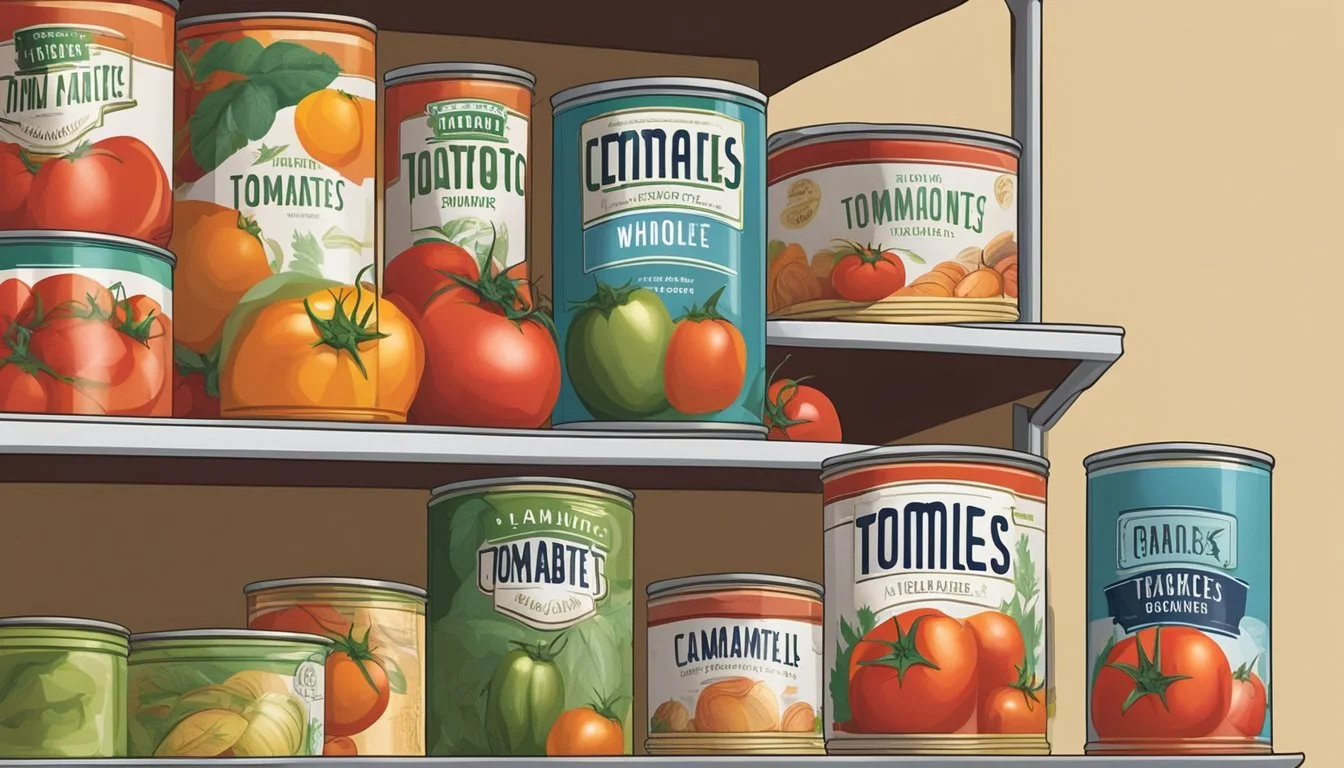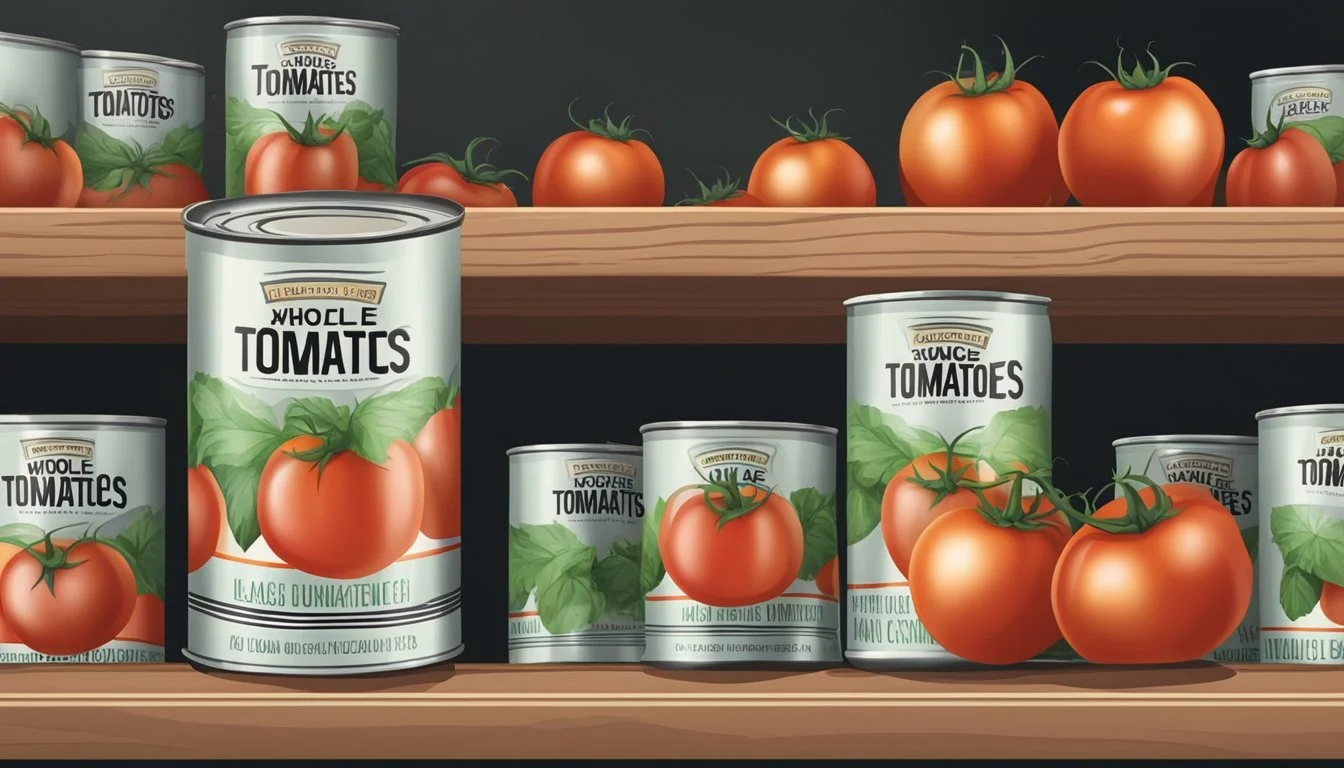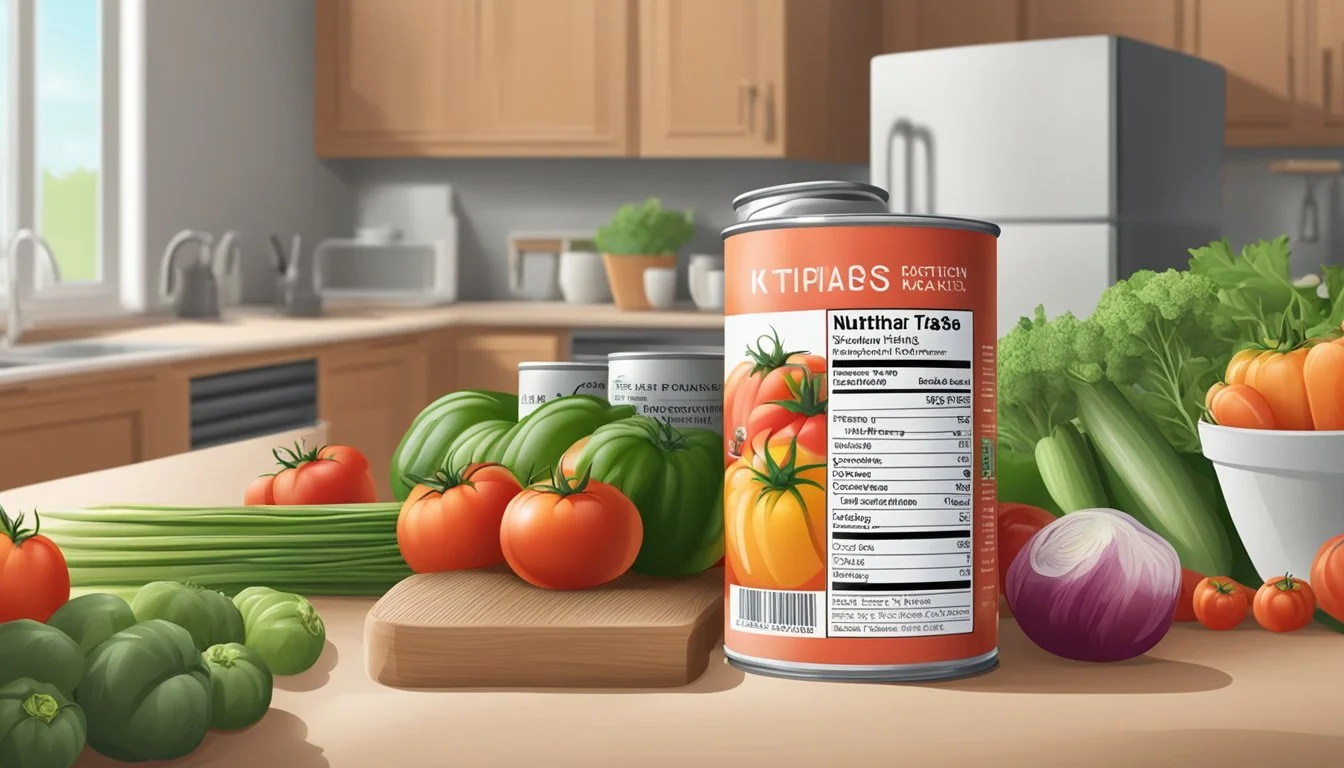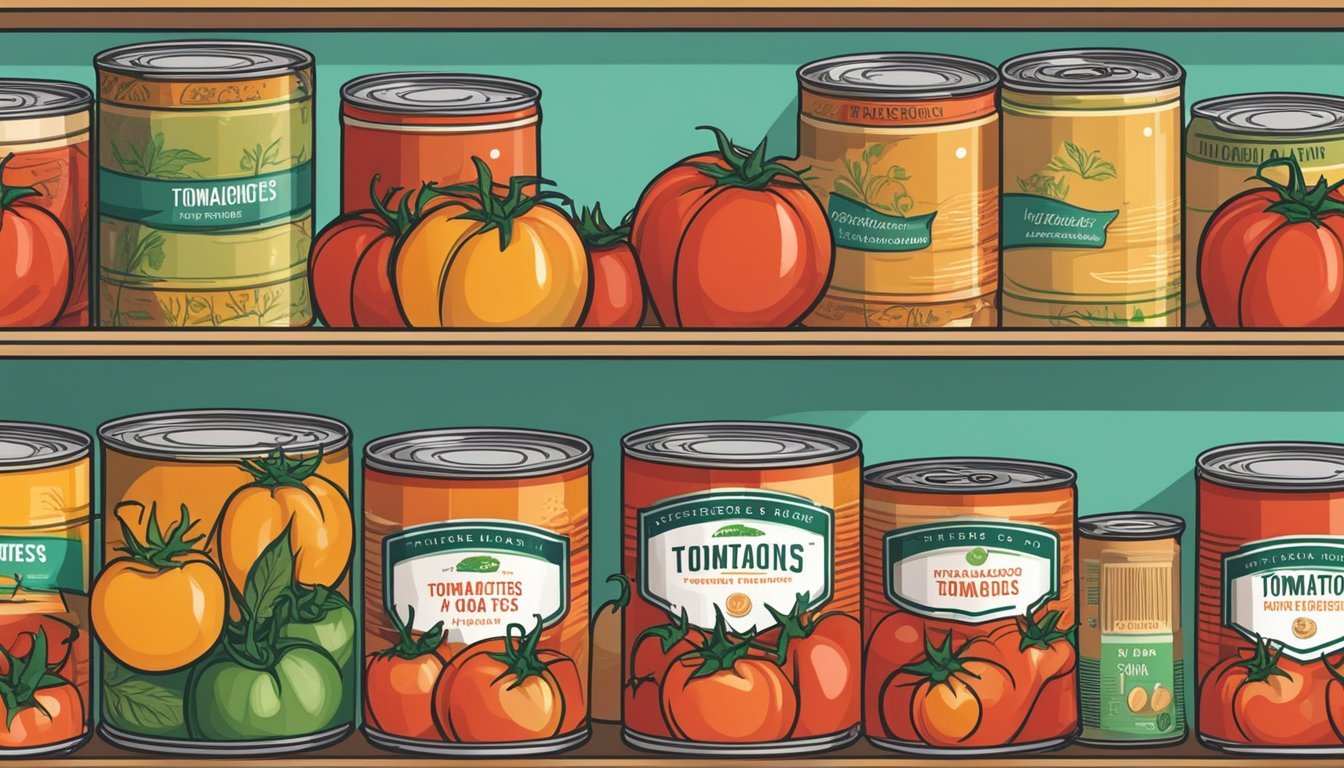Do Whole Canned Tomatoes Go Bad?
Shelf Life and Storage Tips
Whole canned tomatoes are a ubiquitous staple in many kitchens, prized for their versatility and long shelf life. Unopened canned tomatoes can typically last between 18 to 24 months when stored in a cool, dry place, and they remain safe beyond this period if the can’s seal remains intact. This is due to the sterilization process they undergo during canning, which helps eliminate bacteria and enzymes that could cause spoilage.
It's essential to check the condition of the can before consumption. Dents, rust, or bulging in the can may indicate compromised integrity, potentially leading to spoilage. For opened cans, transferring the tomatoes to an airtight container and refrigerating them can keep them fresh for 5-7 days.
The best way to determine if whole canned tomatoes have gone bad is by using sensory cues. If the tomatoes emit an off smell or have visible mold, it's safest to discard them. This article delves deeper into the nuances of canned tomato shelf life, storage tips, and signs of spoilage.
Understanding Canned Tomatoes
Canned tomatoes are a versatile kitchen staple, offering convenience and a long shelf life. Key aspects include the types of canned tomatoes available and the canning process involved to ensure their safety and flavor.
Types of Canned Tomatoes
Canned tomatoes come in several varieties that cater to different culinary needs. Common types include:
Whole Peeled Tomatoes: These are typically packed in tomato juice or puree and are ideal for sauces and soups.
Diced Tomatoes: Pre-cut into small pieces, they're perfect for stews and casseroles where chunks are desired.
Crushed Tomatoes: These have a finer texture, making them suitable for smooth sauces.
Tomato Sauce: Often cooked and blended with spices, this is ready for direct use in recipes.
Some cans contain additives such as calcium chloride to help maintain firmness. Each type serves a specific purpose, enhancing various dishes from stews to marinara sauce.
The Canning Process Explained
The canning process ensures that tomatoes retain their quality and are safe to consume. Tomatoes are initially blanched to loosen skins, then peeled. They are packed into cans with liquids like tomato juice or puree.
Next, cans undergo heating and sterilization to kill any bacteria, often through methods like water bath canning for high-acid foods or pressure canning for low-acid foods. The high acidity of tomatoes aids in preservation, maintaining their pH levels.
Sealing follows, creating an airtight environment to prevent contamination. The integrity of the seal is critical; compromised seals can lead to spoilage. Proper adherence to these steps ensures the tomatoes remain safe for long durations.
How to Store Canned Tomatoes
Proper storage plays a significant role in maintaining the freshness and safety of canned tomatoes. This section will cover the optimal conditions for both unopened and opened canned tomatoes to help maximize their shelf life.
Best Storage Conditions
To ensure unopened canned tomatoes remain fresh for as long as possible, store them in a cool, dry environment. Ideal storage temperatures range between 50°F (10°C) and 70°F (21°C). Keeping them at room temperature in the pantry is usually appropriate. Avoid locations that experience temperature fluctuations or dampness, as these conditions can compromise the can's integrity.
Opened canned tomatoes require refrigeration. Once the can is opened, transfer the tomatoes to an airtight container or cover them with plastic wrap. This prevents contamination and maintains their quality. Store in the refrigerator at or below 40°F (4°C) to keep them safe for consumption.
Tracking the Shelf Life
Unopened canned tomatoes are typically shelf-stable for 18 to 24 months if stored correctly. Although they can remain safe beyond this period if the can’s seal isn’t compromised, it’s best to use them within this timeframe for optimum quality.
Once opened, canned tomatoes should be consumed within 3 to 7 days. Keeping track of the expiration date and the date you opened the can helps prevent usage of spoiled tomatoes. Labeling containers with the opening date is an effective way to manage this.
Proper storage and monitoring can significantly extend the life and quality of canned tomatoes, ensuring they remain a healthy and safe option for your meals.
Identifying Spoilage in Canned Tomatoes
Identifying spoilage in canned tomatoes is crucial to ensure food safety. It involves recognizing visual changes and understanding the factors that can affect their shelf life.
Signs of Deterioration
Appearance Changes: Look for discoloration or darkening of the tomatoes. Mold growth on the surface or around the lid is a clear indicator of spoilage. Texture: Tomatoes that feel slimy or overly mushy should be discarded.
Odor: A sour or foul smell emanating from the can or jar is a strong sign of spoilage. Gas Production: Bubbling or fizzing when the can is opened is likely due to bacterial activity and means the tomatoes are no longer safe to eat.
Factors Affecting Shelf Life
Storage Conditions: Canned tomatoes should be stored in a cool, dry place. Extreme temperatures or fluctuating conditions can shorten their shelf life. Seal Integrity: An intact seal is crucial for the longevity of canned tomatoes. Check for bulging lids or compromised seals before consumption.
Container Type: Glass jars and metal cans have differing durability. Cans can rust, and jars can crack, both potentially leading to spoilage. Processing Method: The canning process itself affects shelf life. Properly pressure-canned tomatoes will last longer compared to those that were not.
Safety and Consumption
Properly stored, unopened canned tomatoes can remain safe to eat beyond their "best by" date if the can is undamaged and sealed. When using canned tomatoes, there are key steps to ensure safety and maintain their quality.
Is It Safe to Eat Expired Canned Tomatoes?
Canned tomatoes, when stored correctly, often stay safe past their "best by" date. High-acid foods like tomatoes typically retain quality for 12 to 18 months. If the can is undamaged and stored in a cool, dry place, the tomatoes inside are usually safe for consumption even after this period. However, quality in taste and texture may decline.
Important Points:
Storage: Keep in a cool, dry area.
Condition: Ensure the can is not bulging, rusted, or leaking.
"Best By" Date: Indicates peak quality, not safety.
Even though the nutritional value remains intact, always inspect canned foods for any signs of spoilage before consumption. Look and smell the contents after opening to ensure they still appear normal.
Precautions Before Use
Before using canned tomatoes, inspecting the can and its contents is crucial for food safety. Check for dents, bulges, or rust on the can. Any sign of damage can compromise the seal and increase the risk of bacterial contamination.
Steps for Inspection:
Visual Check: Look for dents, rust, or leaks.
Seal Integrity: Ensure the can is not bulging.
Smell Test: After opening, the tomatoes should have a typical, fresh tomato scent.
Transferring unused portions to an airtight container and refrigerating can extend their usability for 5-7 days. Always practice good hygiene and food safety to avoid potential health risks associated with spoiled or contaminated food.
Utilizing Canned Tomatoes in Cooking
Whole canned tomatoes are incredibly versatile and can be used in a range of dishes. Understanding how to best incorporate them into recipes, considering their flavor and texture, and enhancing with herbs and spices can elevate your cooking.
Incorporating into Recipes
Whole canned tomatoes can serve as a base or major ingredient in various dishes like pasta sauces, soups, stews, and chilis. They can be chopped, diced, or pureed depending on the texture needed.
For pasta sauce, simmer them with garlic, onion, and basil to create a rich, flavorful base. In soups and stews, they add depth and richness when cooked slowly. They can also be used in chilis, where their natural sweetness complements spicy flavors.
Flavor and Texture Considerations
The flavor of canned tomatoes is often more concentrated compared to fresh tomatoes. They offer a deep umami taste that enhances many dishes. The texture is soft, making them ideal for recipes that require simmering or slow cooking.
Whole peeled tomatoes retain more of their natural structure, making them suitable for dishes needing chunky tomato pieces. Diced or crushed tomatoes, on the other hand, blend more seamlessly into sauces and soups. Adding a bit of sugar can balance out their acidity, ensuring a well-rounded flavor profile in your dishes.
Enhancing with Herbs and Spices
Herbs and spices can significantly elevate the taste of canned tomatoes. Classic pairings include basil, oregano, and thyme for Italian dishes. Adding fresh garlic and onions can further deepen the flavor.
For a spicier kick, incorporate chili flakes or cayenne pepper. In stews and chilis, cumin and paprika can add a smoky element. Parsley and cilantro offer fresh, vibrant notes that complement the rich tomato base. Simmering the tomatoes with these herbs and spices allows their flavors to meld, creating a more flavorful and aromatic dish.
Nutritional Profile of Canned Tomatoes
Canned tomatoes are a convenient and nutritious option, packed with essential vitamins and minerals. They offer health benefits that make them a valuable addition to various dishes, particularly those requiring cooked tomatoes. Because these tomatoes are harvested at peak quality and sterilized, they retain much of their nutritional content even after storage.
Vitamins and Minerals in Canned Tomatoes
Canned tomatoes are rich in vitamin C, which is vital for immune health and skin care. They also contain significant amounts of vitamin A, essential for vision and immune function. These tomatoes provide vitamin K, important for blood clotting, and several B vitamins like B6 and folate that support energy levels and brain health.
Minerals like potassium contribute to heart health and help maintain fluid balance. Iron in canned tomatoes supports blood health, while magnesium and phosphorus aid in bone health. It's important to check the salt content, as some canned tomatoes are high in sodium, which could affect blood pressure.
Health Benefits
Canned tomatoes are a rich source of antioxidants, particularly lycopene, which has been linked to a lower risk of chronic diseases like cancer and heart disease. The high water content in these tomatoes helps with hydration, and their nutrient density supports general wellness.
The convenience of canned tomatoes means they can be used year-round, adding nutritional benefits to diets where fresh tomatoes are unavailable or out of season. While sterilization and storage may slightly degrade some nutrients, they still offer considerable health advantages.
The Lifecycle of Canned Tomatoes
Canned tomatoes undergo a thorough process from the farm to your pantry, ensuring their quality and safety. Key steps include harvesting, preserving, and proper storage, which are essential for maintaining their peak quality and shelf life.
From Production to Consumption
Harvesting begins with selecting ripe, high-quality tomatoes. Varieties such as San Marzano are often chosen for their sweet flavor and optimal texture. Fresh tomatoes are inspected for damage and washed thoroughly to remove any dirt or debris.
Preservation involves skinning and seeding the tomatoes. Whole tomatoes are often canned in their juices, while stewed tomatoes undergo additional cooking. The process must be precise to prevent any contamination. Once sealed, cans are processed at high temperatures to kill bacteria and enzymes, locking in flavor and texture.
Storage conditions greatly influence the shelf life of canned tomatoes. Keeping them in a cool, dry place at room temperature helps maintain their best quality. Exposure to heat and direct sunlight can degrade their flavor. Unopened canned tomatoes can last for several years. Once opened, transferring the contents to an airtight container and refrigerating is crucial to prolong their use.








